Edie Melson's Blog, page 149
October 3, 2021
5 Reasons to Join Author Street Teams

by Kristen Hogrefe Parnell @khogrefeparnell
As writers, we often fill the free space in our calendars with writing deadlines, learning opportunities, and platform work. Might I add one more item to that list? Apply to participate in another author’s street team or book launch team.
Why should you join one, aside from the pure enjoyment of being an advance reader?
Consider these reasons.
#1: Encourage another author.Recently, Joshua J. Masters encouraged us authors to view our street teams as ministry opportunities. If you missed the post, I hope you’ll go back and read more about this perspective.
The flip side is that participating readers also have a chance to minister back to the author. I would challenge street team members to focus less on “what’s in it for me” and more on “how can I encourage this author?”
If you’re an author, you know how priceless a positive review is or how just one short email from a reader can brighten your day. Street team members have several opportunities to bless an author and promote the project’s success, including:Marking the book as “want to read” on GoodreadsAdding a review to Goodreads as soon as the book appears on the siteParticipating in the cover revealSharing about the book on social media Requesting the book at your local libraryPosting reviews on Amazon and other bookseller websites on release dayYou may even be able to connect book clubs or other groups to the book, blessing the author in unexpected ways.
#2: Meet other like-minded readers.A perk of joining a launch team is getting to know and engaging with fellow team members who enjoy the same types of books you do. While some street team members will be authors, many are readers who are passionate about the author or the project.
As we authors know, networking is huge in this industry. Launch teams provide an opportunity for you to meet other likeminded readers and authors. You can then connect with them on social media and help share and like each other’s posts about the upcoming release.
You never know where these connections will lead.
#3: Promote within your genre.You might think that promoting other authors who write in your genre will detract from your own readership, but more than likely, you’ll discover the opposite is true. For example, let’s say you find a new author on Instagram and you don’t know anything about her project. However, that author has posted about several authors in her genre that you do recognize. If you enjoyed those books, you might check out the new author’s book by virtue of association.
The same is true for your writing. When you help your readers find other authors who might interest them, you also help new readers get a better feel for your own books when you share about related books. Joining a launch team is one way to help promote those authors and projects you personally endorse, and in the process, help cement your own brand.
#4: Discover ideas you might use (or not use) for your future street team.As a writer, you can learn so much from other authors and their book launch efforts. Maybe you really like the way the author conducts his book reveal. Start a file with examples that stood out to you. You’ll have to adjust your approach because every book is different, but you may discover some “templates” that will work well for you.
The opposite is also true. Maybe you’re on a street team and are starting to feel overwhelmed by long emails from the author with so many action items that you can’t keep track of them. Take note! When you organize your own street team, avoid the long emails or complicated action steps that made you feel weary. By understanding how a street team member feels, you can better organize your own team one day.
#5: Have fun!This reason is a given. Participating in launch teams gives you a chance to better connect with the author, the book, and sometimes even snag some fun book swag.
Are there any drawbacks? Aside from the time commitment, I can think of just one: If the book is the first in a planned series, you will have to wait extra-long for the sequel—unless you apply for its street team as well.
Have you participated in street teams before? What was your favorite part?
TWEETABLE5 Reasons to Join Author Street Teams from @KHogrefeParnell on @EdieMelson (Click to Tweet)
 Kristen Hogrefe Parnell writes novels, learns something new every day, and runs for pizza. An educator and mentor, she teaches English online and is an inspirational speaker for schools, churches, and podcasts. Her young adult dystopian novels, The Revisionary and The Reactionary, both won the Selah for speculative fiction, and she signed with Mountain Brook Ink for a new romantic suspense series, coming December 2022. Kristen and her husband live in Florida and enjoy sharing their lake home with family and friends. She blogs at KristenHogrefeParnell.com where she challenges readers to find faith in life’s everyday adventures.
Kristen Hogrefe Parnell writes novels, learns something new every day, and runs for pizza. An educator and mentor, she teaches English online and is an inspirational speaker for schools, churches, and podcasts. Her young adult dystopian novels, The Revisionary and The Reactionary, both won the Selah for speculative fiction, and she signed with Mountain Brook Ink for a new romantic suspense series, coming December 2022. Kristen and her husband live in Florida and enjoy sharing their lake home with family and friends. She blogs at KristenHogrefeParnell.com where she challenges readers to find faith in life’s everyday adventures.
October 2, 2021
A Writer’s Purpose

by Audrey Frank @AudreyCFrank
And I tell you that you are Peter, and on this rock I will build my church, and the gates of Hades will not overpower it(Matthew 16:18).
Do you know your purpose, writer?
Purpose is a wiggly thing. Just when we think we have a firm grip on it, it slips out of our hands.
There is a way to know for sure. To have rock-solid confidence in what we were made for. And the irony is, this kind of purpose actually grabs hold of us.
A young man named Simon found his purpose unexpectedly one day in a dusty town called Caesarea. The Hebrew name Shimon comes from the root word shema . Shema technically means to hear, but within the Hebrew context, it unfolds to reveal so much more: to listen, to understand, and to respond.
Simon was living up to his name the afternoon Jesus asked the disciples, “But who do you say that I am?” (Matthew 16:15). Outsiders and onlookers were buzzing with opinions about who exactly Jesus was. Jesus’ question to his inner circle was direct and poignant: But who do you say that I am?
Listening intently, Simon exclaimed, “You are the Christ, the son of the living God!” (Verse 16).
In that moment, Purpose grabbed Simon and gave him a new name.
And I tell you that you are Peter, and on this rock I will build my church, and the gates of Hades will not overpower it (Matthew 16:18).
Peter, or Pétros in Greek, means rock.
Peter’s purpose was rock-solid.
For the rest of his life, in good times and bad, the purpose words spoken by Jesus held Peter tight. Purpose picked him up when the anguish of betrayal urged him to throw himself down (Luke 22:54-62). Purpose kept him standing before the accusing masses (Acts 2:14-42). Purpose gave him the wisdom to step outside his limitations and believe for bigger things (Acts 10:9-16).
Writer, we can know such purpose.
The voice of Jesus rings through the ages, asking you and me,
But who do you say I am?
Our answer to this question determines everything.
For those who lean in and listen deep, understanding comes like a joy-filled belly laugh. As the scarred hands grab us tight in celebration of who we were made to be we can’t help but declare along with Simon,
You are the Christ, the Son of the Living God!
And with that, it is done.
Purpose grabs us and doesn’t let go. Purpose is a Person, and his name is Jesus. He made us to write. To steward the words of the One who chases the broken, loves justice, restores the destroyed, heals the wounded, and honors the shamed.
And for the rest of our lives, through good times and bad, Purpose will hold us tight. He will pick us up when discouragement tries to throw us down. He will give us the wisdom to step outside of our limitations and believe for bigger things.
Lord, give me eyes to see who You are. Make my purpose rock-solid today. Amen.
TWEETABLEA Writer's Purpose thoughts from @AudreyCFrank on @EdieMelson (Click to Tweet)
 Audrey Frank is an author, speaker, and storyteller. The stories she shares are brave and true. They give voice to those whose words are silenced by shame, the hard things in life that don’t make sense, and the losses that leave us wondering if we will survive. Audrey and her family have spent over twenty years living and working among different cultures and world views, and she has found that God’s story of redemption spans every geography and culture. He is the God of Instead, giving honor instead of shame, gladness instead of mourning, hope instead of despair. Although she has three different degrees in communication and intercultural studies, Audrey’s greatest credential is that she is known and loved by the One who made her.
Audrey Frank is an author, speaker, and storyteller. The stories she shares are brave and true. They give voice to those whose words are silenced by shame, the hard things in life that don’t make sense, and the losses that leave us wondering if we will survive. Audrey and her family have spent over twenty years living and working among different cultures and world views, and she has found that God’s story of redemption spans every geography and culture. He is the God of Instead, giving honor instead of shame, gladness instead of mourning, hope instead of despair. Although she has three different degrees in communication and intercultural studies, Audrey’s greatest credential is that she is known and loved by the One who made her.Audrey is the author of Covered Glory: The Face of Honor and Shame in the Muslim World (Harvest House Publishers), an outpouring of Audrey’s heart to introduce others to the God of Instead. Shame is not unique to the developing world, the plight of the women behind veils, young girls trafficked across borders; shame is lurking in hearts everywhere. Through powerful stories from women around the world, Covered Glory illuminates the power of the Gospel to remove shame, giving honor instead. Available at favorite booksellers: BARNES & NOBLE , BOOKS A MILLION, AMAZON.
October 1, 2021
5 Ways to Solicit Stories for an Anthology

by Kathy Howard @KathyHHoward
I had not planned to write this particular book. But God brought me the opportunity.
It all began with a century-old letter. I found the treasure at my parents’ house, tucked under an ancient pair of spectacles in a dented metal box. I carefully unfolded the yellowed, brittle paper and struggled to read the faded ink. The letter was dated March 26, 1914. Addressed to Howell Adam Shouse, my great-grandfather on my mother’s side, it was written by his mother, Mary Dozier Shouse, more than a century ago.
Much of the news was what you’d expect—who’d been sick, who’d gotten married, who’d been to visit, and how she longed to see her “dear son.” But one particular paragraph brought me to tears:
“Oh, how much I do pray for you every single morning and night. I pray mightily to the Lord that you Howell and your children may be convicted and converted and sanctified. Never a day do I miss. May God hear and answer my prayers.”
This letter both challenged and inspired me. First, it challenged me to faithfully intercede for the spiritual well-being of my loved ones and to be purposeful about the faith legacy I leave behind. Second, the discovery inspired me to search for more evidence of my ancestors’ faith. But God had a slightly different search in mind.
The letter turned into a book
An editor from Tyndale contacted me the very morning that an article I wrote appeared on the Proverbs31 ministry site. In the piece, “Prayers from My Great-Great-Grandmother,” I described the treasure I found, how my great-great-grandmother’s prayer impacted me, and how I long for my faith to inspire my own descendants.
The Tyndale editor thought I might be a good fit for a book project she had in mind. She wanted to produce a devotional book that reflected her avid hobby—genealogy research. Although I have dabbled in it, I am a total novice. Thankfully, she would supply the ancestry research tips for the book. She needed a writer who could find and write the stories of faith. Yep, I could do that.
So, I honed the idea with the editor, submitted the proposal, and waited. During the wait I began to think about the stories. I needed fifty-two stories of faith—stories that demonstrate how the faith of our ancestors still impact us today. And I wanted stories that would inspire the reader to be intentional about their own spiritual legacy. As soon as I signed the contract with Tyndale for “Heirloom: Living and Leaving a Legacy of Faith,” I began the hunt.
5 Ways I Solicited Stories
I knew that not every offered story would be a good fit. And many stories would be similar to each other. As wonderful as they are, I could only use so many stories about praying grandmothers. I needed a wide variety of stories with each one exemplifying a solid spiritual principle. So, I needed to mine as many stories as possible, then search through them to find the jewels. I used all my sources and enlisted help from others.My Email List: I started my search with the thousands of readers on my email list. Many are faithful readers and invested in my ministry. First, I sent an initial request explaining the project and the stories I needed. Then as the submission deadline drew nearer, I sent two more quick reminder emails. My Blog: The post described the project and what kind of stories I needed. It also included a link to a contact form to submit their information and the basics of their story. This kept the submissions in one place and out of my inbox.Social Media: I shared the blog and other posts. I also did a few Facebook lives asking for stories.Friends and Family: I’m afraid I got to be a little obnoxious. I talked about the project everywhere I went and mentioned it to just about everyone I came into contact with. Then I asked them if they knew of anyone else who might have stories. The Publisher: I got plenty of submissions, but lacked a few solid stories. So, Tyndale jumped in to help by sending out a request to employees. And that put us over the top!I also asked readers and followers to share the email, blog, and posts with anyone they thought might have a story. I tried to respond to every submission right away, but clearly stated that not all the stories would be included. I rejected some due to overlap and others because the stories lacked meat. But the fifty-two stories included in “Heirloom” tell great stories of faith and give solid examples of what it means to build and leave a spiritual legacy. And it was all God’s idea.
TWEETABLE5 Ways to Solicit Stories for an Anthology - @KathyHHoward on @EdieMelson (Click to Tweet)
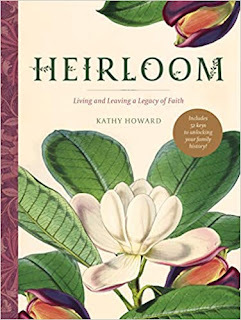 “Heirloom: Living and Leaving a Legacy of Faith” tells stories of the past that will impact our faith today. These 52 heart-felt reflections reveal the seeds of our faith―seeds that sprouted and took root, growing through the centuries to today. Heirloom weaves these stories of faith and family history with Scripture, beautiful artwork, and ancestry research tips and techniques. Through these stories of persevering faith you’ll discover the potential your story has to impact future generations. (See “Heirloom” on Amazon.)
“Heirloom: Living and Leaving a Legacy of Faith” tells stories of the past that will impact our faith today. These 52 heart-felt reflections reveal the seeds of our faith―seeds that sprouted and took root, growing through the centuries to today. Heirloom weaves these stories of faith and family history with Scripture, beautiful artwork, and ancestry research tips and techniques. Through these stories of persevering faith you’ll discover the potential your story has to impact future generations. (See “Heirloom” on Amazon.) Kathy Howard is a treasure hunter. She hunts for the creamiest chocolate and richest coffee. She searches for cherished stories of faith that still impact hearts. And, she digs deep into God’s Word, mining His eternal truths for herself and to share with others. With more than 30 years of experience, Kathy has taught in dozens of states, internationally, and in a wide range of venues including multi-church conferences and large online events. She has a Masters of Christian Education from the Canadian Southern Baptist Seminary. Kathy is the author of 11 books, including “Heirloom: Living and Leaving a Legacy of Faith” and the new “meaty” devotional series “Deep Rooted.” She writes for multiple online magazines and devotional sites. Kathy and her husband live in the Dallas/Ft Worth area near family. They have three married children, six grandchildren, and two accidental dogs. Kathy provides free discipleship resources and blogs regularly at www.KathyHoward.org.
Kathy Howard is a treasure hunter. She hunts for the creamiest chocolate and richest coffee. She searches for cherished stories of faith that still impact hearts. And, she digs deep into God’s Word, mining His eternal truths for herself and to share with others. With more than 30 years of experience, Kathy has taught in dozens of states, internationally, and in a wide range of venues including multi-church conferences and large online events. She has a Masters of Christian Education from the Canadian Southern Baptist Seminary. Kathy is the author of 11 books, including “Heirloom: Living and Leaving a Legacy of Faith” and the new “meaty” devotional series “Deep Rooted.” She writes for multiple online magazines and devotional sites. Kathy and her husband live in the Dallas/Ft Worth area near family. They have three married children, six grandchildren, and two accidental dogs. Kathy provides free discipleship resources and blogs regularly at www.KathyHoward.org.
September 30, 2021
For Writers: 3 Tips to Untangle a Complex Plot

by A.C. Williams @ACW_Author
I have really long hair, and there’s nothing worse than when it gets tangled. Tangles don’t just go away, either. The longer you leave them, the worse they get. And then when you finally take a brush to them, it hurts like the dickens to get them all out.
A nice personal tidbit, right? But what does that have to do with writing? Well, when I think about tangles and having to invest hours of painful focus to get all the knots out, I think about some of the tangled plot lines I’ve had to edit over the years.
There’s little in the writing life more painful than a tangled plot. Your story threads get all knotted, and your characters get lost in the chaos. And straightening it all out HURTS.
So is there a way to keep your plot from getting all tangled and complex? Not always, but I have three questions I ask myself that usually help me decide what to keep and what to toss.
3 Questions to Help Tackle Plot Tangles
1. Why are you writing this story?
Is it the lesson you want your readers to take away? Is it a character arc that your protagonist or antagonist follows? Is it experiencing the thrill and wonder of a fantasy world? What matters the most?
Novels are complex things by nature, and it’s easy to get distracted and wander off after every squirrel that darts across your path. But not every squirrel is worth chasing. How can you tell which ones you should chase and which ones you should ignore? Know your why.
If you’re writing primarily to sell books, you will need to stay within the boundaries of your genre. You should also stick to recognizable tropes. Knowing this will inform your character arcs and your plot lines.
But what if your objective is to make your readers think? To leave them with a challenge? Well, then maybe your story shouldn’t follow an expected trope. If that’s your why, it may be a better idea to bend the genre rules.
Regardless, knowing the point of your story will help you make the important decisions when it comes building your plot structure.
2. How many characters do you actually need?
This is a tough one. How many characters should a story have in it? How many characters should a story follow? And, along with this, how many of those characters should get a voice in the story itself?
I wish I could tell you there was an easy answer, but there isn’t. There’s no one-size-fits all solution for this one. It will vary from story to story.
What I have noticed over the years, though, is that many writers believe that an excellent novel has both a complex plot structure AND complex characters. And that’s not necessarily untrue, of course, but it’s much harder to pull off than it sounds. If you think about some of the greatest stories in literature, they usually only have one or the other.
A complex plot structure makes it very difficult to pull off a complex character, and vice versa. That’s why we usually see a simple character with a complex plot (Murder on the Orient Express), and a simple plot with a complex character (Pride and Prejudice). If you aim for complexity of both plot and character at the same time, they will diminish each other.
Do you need a gardener AND a beekeeper? Does your story need a mechanic AND an engineer? Many times, if a single character doesn’t have a complete story arc, the best way to fix it can be to take another character with an incomplete story arc and combine them.
And as far as how many perspective characters you need? If you’ve never written an ensemble cast novel before, please don’t try to write a book with seven POV characters. Ensemble casts are much harder to write than they sound, so give yourself a few years to learn how to write a single perspective novel extremely well. Then you can add other perspectives in.
3. And finally, how many subplots do you actually need?
This is connected to the previous question about the number of characters you should have. Once you have a feel for how many characters your story needs, you can make a better decision about the number of subplots that are appropriate.
This also depends on genre. High fantasy usually has many more subplots than a murder mystery or a romance novel, but that’s because most high fantasy novels are expected to be longer than other genres.
Just keep in mind that your subplots are less important than your main plot. Remember your why. Even your subplots should connect to your story’s purpose. If they distract from the purpose of the story, you don’t need them.
Not to get controversial, but the 2017 movie Star Wars: The Last Jedi offers a good example of a useless subplot. The movie featured a casino subplot that played no role whatsoever in the storyline. It didn’t move the story forward, grow the characters, or establish important story elements. Personally, I enjoyed the movie overall, but that particular part was more of a distraction than anything else.
In storytelling, distracting your readers is a huge no-no. We can’t give them an excuse to quit reading.
So keep your story simple. Don’t get bogged down by complicated plot structures or overly complex character designs. Tell a great story with relevant emotional appeal and do it using captivating characters who know what they want.
Stop those tangles before they start, and when it’s time to brush your plot out, you’ll have much smoother sailing.
TWEETABLEFor Writers: 3 Tips to Untangle a Complex Plot from A.C. Williams, @ACW_Author on @EdieMelson (Click to Tweet)
 A.C. Williams is a coffee-drinking, sushi-eating, story-telling nerd who loves cats, country living, and all things Japanese. She’d rather be barefoot, and if isn’t, her socks will never match. She likes her road trips with rock music, her superheroes with snark, and her blankets extra fuzzy, but her first love is stories and the authors who are passionate about telling them. Learn more about her book coaching services and follow her adventures on social media @ACW_Author.
A.C. Williams is a coffee-drinking, sushi-eating, story-telling nerd who loves cats, country living, and all things Japanese. She’d rather be barefoot, and if isn’t, her socks will never match. She likes her road trips with rock music, her superheroes with snark, and her blankets extra fuzzy, but her first love is stories and the authors who are passionate about telling them. Learn more about her book coaching services and follow her adventures on social media @ACW_Author.
September 29, 2021
Is NaNoWriMo Right for You?
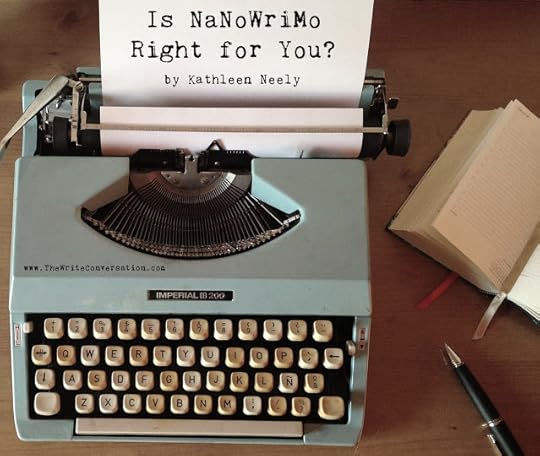
by Kathleen Neely @NeelyKneely3628
If you’re an author, you have probably heard of NaNoWriMo—National Novel Writing Month. You can visit their website at nanowrimo.org .
November is designated as National Novel Writing Month. Yes, I said November, the month of Thanksgiving, the busiest travel time of the year. The time for long lines at airports and bumper-to-bumper traffic. Add to that, preparations for Christmas. It’s a time for family, falling leaves, bonfires, and homemade soup.
I’m sure that whomever designated November for this honor was neither a writer nor a mother. Okay, now that I’ve gotten my pet peeve out of the way, I’m still a writer and NaNoWriMo is coming.
Here’s the premise. Commit to writing 50,000 words in 30 days. If you sign up on their website, you’ll see opportunities to track peaks and valleys in your journey and earn achievement badges. More importantly, you’ll have the chance to interact with other writers, those who understand your challenges. They can inspire and motivate you.
If you want a successful NaNoWriMo experience, plan ahead. Their website suggests that you begin planning in September. That doesn’t mean starting your word count.
Prewriting is a timely task.
Here are a few important elements of the prewriting stage. Inspiration: What are you going to write? Remember, this is a novel. That includes fiction and some non-fiction books. A non-fiction novel would be based on true events, but written in a story style. This can include memoirs. It does not include non-fiction such as a devotional or self-help book. Research: The need for this varies, but all novels require it. If you’re a writer of historic fiction, your research will be extensive. Your novel set in the Civil War, Holocaust, or Regency Era must be authentic to the culture. A contemporary novel still requires research. I needed to seek out some legal expertise for The Street Singer which involves a law suit, and I couldn’t have written Beauty for Ashes without the help of my friend from Puerto Rico. Research your setting. Those who live there will appreciate your accuracy. Plotting: Wherever you happen to fall on the spectrum from pantsers to plotters, some planning is necessary. Before you begin, even the pantsers should know how the story will end. You need to plan for character development. The protagonist must show some changes from the start to the finish. I like to allow details and scenes to emerge along the way. I’m not a firm plotter with a chapter-by-chapter outline. Yet I have a skeletal plan from the start. All of these prewriting tasks can be accomplished before the start of NaNoWriMo. It will help to make your actual writing count go quickly. The required 50,000 words can be a novel. Hemingway was known for keeping them short. But typically, publishers look for 80,000+ words. That’s okay. You have your 50,000 words which include your plotted story. When November’s over, it’s time for post-writing. I’m not sure if that’s an accurate term, because this is such an important, integral part of creating a great novel. Now’s the time to edit, edit, edit. Add sensory details. Examine emotions. Don’t add words for the sake of word count. Add them to grow your story.
I love the idea of a National Novel Writing Month. It provides the motivation often needed. I did the math—50,000 words in 30 days means 1,667 words daily. Sigh. A feasible task in January, a challenge in November. But come November, I’ll be writing. Will you?
TWEETABLEIs #NaNoWriMo Right for You? Kathleen Neely, @NeelyKneely3628 shares her inspiration on @EdieMelson (Click to Tweet)
Kathleen Neely is a retired elementary principal, and enjoys time with family, visiting her two grandsons, traveling, and reading.
She is the author of The Street Singer, Beauty for Ashes, The Least of These, and In Search of True North. Kathleen won second place in a short story contest through ACFW-VA for her short story “The Missing Piece” and an honorable mention for her story “The Dance”. Both were published in a Christmas anthology. Her novel, The Least of These, was awarded first place in the 2015 Fresh Voices contest through ALMOST AN AUTHOR. She has numerous devotions published through CHRISTIAN DEVOTIONS.
Kathleen continues to speak to students about writing and publication processes. She is a member of American Christian Fiction Writers.
WEBSITE – www.KathleenNeely.com FACEBOOK – www.facebook.com/kathy.neely.98TWITTER - https://twitter.com/NeelyKneely3628INSTAGRAM – www.Instagram.com/KathleenNeelyAuthor
September 28, 2021
10 Traits of a Well-equipped Writer

by Edie Melson @EdieMelson
When each of us chooses to label ourselves as a writer, we are embarking on a journey that’s not for the faint of heart. To find joy—and yes, even a little success—we need to make sure we’re well-equipped for what lies before us.
I know many of you who read this blog, and I have to confess I’m thinking of you specifically as I write this. Yes, these are things I’ve tried to cultivate in my writing life—but they’re also things I SEE in your lives.
You are an inspiration to me, to each other and to those around you.
So today I’m sharing what I’ve learned—and what I know will make your journey easier. Developing these characteristics will help you find more joy as you climb to the places God has for you.
10 Traits of Well-equipped Writers
1. You know Who’s really in charge. Those of us who are believers who write must remind ourselves that while we can make plans, it is God Who directs our paths. So often through the years, what I’ve thought was a set-back was actually a short cut to the place I needed to be.
2. You learn to adapt to change. I’ve heard it said more times than I can count that the only constant in the publishing world is change. The ability to adapt when life throws a curve ball is what sets well-equipped writers apart from the rest.
3. You focus on solutions, instead of problems. Writers are creatives. We concoct stories out of thin air and offer commentary on the world that others haven’t considered before. But often times when challenges arise, we forget to look for answers. Instead we focus on what’s gone wrong.
4. You are aware of your own strengths and weaknesses. A well-equipped writer knows what she’s good at and what she needs to work on. You know what you need to get where you want to be.
5. You put rejection in its place quickly. Rejection is part of this business. It hurts, and often times—because publishing is subjective—it’s unfair. To keep going, you’ve learned how to take a little bit of time to rant, and then move beyond the hurt.
6. You learn from mistakes. Not just your own mistakes, but you’re wise enough to learn from those that others make. Truthfully I’ve learned way more from what I’ve done than what I’ve done right.
7. You create a community of people to encourage, support and help you. Putting words on paper—or on a screen—can be a lonely process. The well-equipped writer has surrounded himself with others who are on the same path and together they are stronger.
8. You know how to stay focused when the pressure is on. Instead of throwing in the towel, you double down and do what has to be done. I’ve watched many of you finish books through illness, family issues and loss. You’ve lost contracts, had publishers go out of business, and yet you persevere.
9. You remain connected to the ultimate Creator. You make the time to meet regularly with God. Because of that, your words reflect His light. They illuminate a world that is dark and is in desperate need of hope.
10. You know there is no competition. The Christian writing world is the most generous community I’ve ever imagined being part of. To the rest of the world, it looks like we’re training our competition. But the truth is, there’s more than enough work to go around. We are stronger when we help each other along the path.
These are the things that I’ve discovered make the writing journey joyful and a path I want to explore for the rest of my life. I’d love to know what you’d add to the list!
Don’t forget to join the conversation!Blessings,Edie
TWEETABLE10 Traits of a Well-equipped Writer - @EdieMelson (Click to Tweet)
 Edie Melson is a woman of faith with ink-stained fingers observing life through the lens of her camera. No matter whether she’s talking to writers, entrepreneurs, or readers, her first advice is always “Find your voice, live your story.” As an author, blogger, and speaker she’s encouraged and challenged audiences across the country and around the world. Her numerous books reflect her passion to help others develop the strength of their God-given gifts and apply them to their lives. Connect with her on her WEBSITE, through FACEBOOK, TWITTER and on INSTAGRAM.
Edie Melson is a woman of faith with ink-stained fingers observing life through the lens of her camera. No matter whether she’s talking to writers, entrepreneurs, or readers, her first advice is always “Find your voice, live your story.” As an author, blogger, and speaker she’s encouraged and challenged audiences across the country and around the world. Her numerous books reflect her passion to help others develop the strength of their God-given gifts and apply them to their lives. Connect with her on her WEBSITE, through FACEBOOK, TWITTER and on INSTAGRAM.
September 27, 2021
Dipping the Quill Deeper: Figuring Out the Days of Our Lives
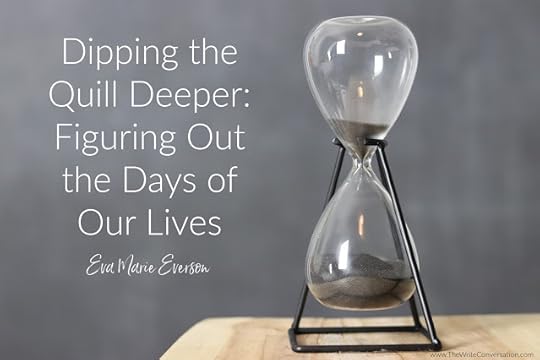
by Eva Marie Everson
Like sands through the hourglass . . . so are the days of our lives.
Do you remember those words? If you grew up in a certain era and your mother was a homemaker, you probably do. They were spoken at the beginning of the daytime soap opera, Days of Our Lives, by actor Macdonald Carey. They quoted Socrates who said, “Our lives are but specks of dust falling through the fingers of time. Like sands of the hourglass, so are the days of our lives.”
Finding this quote caused me to sit up straighter than usual. Our lives are but specs of dust . . . Doesn’t my latest book, Dust, address this notion: are we just dust?
I remember slowly waking in my childhood bedroom, the sun streaming through the cotton curtains with yellow and white flowers splattered across the fabric. There could be no sleeping late in a room of such brilliant light. But I laid there, sometimes for long minutes, watching the dust skip and dance through the rays and prisms, wondering where the tiny specs had begun and where they would end, trying to follow just one.
If Socrates was correct, then there is no beginning and no end and no purpose. I don’t believe that. While I may not know where those specs of dust began, I do know where they ended: on a dust cloth wet with lemon-scented Pledge. I so don’t agree with Socrates that I spent two and a half years writing a saga to prove it. We all have value. We all have worth. What we do with that, consciously or unconsciously, is up to us.
And God.
Recently, a trip to St. Louis was interrupted by an old friend of mine, Epstein Barr Virus. I’ve pretty much kept this rascal under control for thirty years, but it dropped by to say hello just before the trip and decided to wear out its welcome. I cancelled the trip to entertain Mr. EBV. Alerting friends and colleagues that I wouldn’t attend the much-anticipated conference resulted in one of the colleagues (who also knows Mr. EBV) to contact me. She asked if she could possibly interview me for her show, Reach to Touch with MJ. I told her she could. And she did.
And it got me to thinking (a sometimes-dangerous thing). As I recalled my story, I told the host that my EBV had begun as mono right about my 16th birthday. On a Sunday (my birthday was on Tuesday). The night before, my parents had thrown a party for me and then, on Sunday morning, I woke with a headache. But, like all good Christian Southern girls in 1973, I got up, got dressed, and went to church where I continued to nurse this bugger. I made it home where I took my temp (102) and then downed a couple of aspirins (because my friends were coming over and we were going to go motorcycle riding). And, yes, I went for the ride. Came home and collapsed into bed. The next morning was the first day of school and, although miserable, I attended. But by Tuesday—happy birthday to me—I couldn’t get out of bed. Within a week, I was in the hospital. I was one sick puppy.
A year or so later, I became sick again, but my doctor ruled out mono. He couldn’t say what the virus was, he could only say that I was sick. After a week in the hospital, I returned home. Then, about two years later, I wound up in the hospital again, this time sicker than sick. My parents were called in and told to prepare to say goodbye. Fortunately, we didn’t have to have that conversation.
A full decade passed plus a few years on top of that. By now I’m a wife and mother. I worked full time and had an active social and church life. I came home one afternoon and said to my husband, “I don’t feel well.” I decided to take a short nap and, as I say to wrap this story up with a bow, “I didn’t get up for five years.”
Naturally, I did get up, but the next six months were spent in doctors’ offices and labs. I grew sicker and sicker. More and more tired. My symptoms were a conglomerated mess that seemed to have no rhyme or reason. Finally, I was diagnosed with EBV—incurable but treatable.
In the interim, I returned to an old love of mine—reading. And with each completed book, I humbly declared, “I believe I could have written that.” You see, I had another old love, one that I’d basically kept hidden for years: writing. I wrote short story after short story but, other than the hubby, few knew.
I started writing again. And I got involved with this small group of five who were determined to help each other with their writing and with publication. That number grew and, in time, became Word Weavers International of which I am the president. We now top 1,000 members and my days are spent predominately helping writers at various levels.
So the interview made me think back to that Sunday morning in 1973 when I woke up with a headache that wouldn’t go away and a fever I refused to confess to. You see, Mr. Socrates, I believe God was at work, even then. He knew that one day I’d need a reason and a way to stop what I was doing in my Type-A-Personality life. A reason to stop long enough to rest and read and pick up the pen again. Long enough to get better and find a writers group. And then, He opened a door to the world of publication . . . knowing that I wouldn’t go alone. That my heart would yearn to help others. That Word Weavers would be born and that my role would be what my role is. Even as I lay in one hospital bed after the other, God saw what would be when the right time came.
Specs of dust? I don’t think so, although it makes a great title for a novel. Sands through the hourglass? They are fleeting, for sure, but in God’s hand and in His timing, they do more than count the hours.
TWEETABLEDipping the Quill Deeper: Figuring Out the Days of Our Lives encouragement from Eva Marie Everson on @EdieMelson (Click to Tweet)
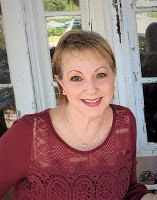 Eva Marie Everson is the president of Word Weavers International and the director of its two conferences. She is the multiple award-winning author of nearly 40 works and has received awards as a speaker and Bible teacher. Eva Marie is often seen at writers conferences across the States. She served as a mentor for Jerry B. Jenkins’ Christian Writers Guild for several years, and taught as a guest professor at Taylor University in 2011. She and her husband make their home in Central Florida where they enjoy their grandchildren. They are owned by one small dog and a princess cat.
Eva Marie Everson is the president of Word Weavers International and the director of its two conferences. She is the multiple award-winning author of nearly 40 works and has received awards as a speaker and Bible teacher. Eva Marie is often seen at writers conferences across the States. She served as a mentor for Jerry B. Jenkins’ Christian Writers Guild for several years, and taught as a guest professor at Taylor University in 2011. She and her husband make their home in Central Florida where they enjoy their grandchildren. They are owned by one small dog and a princess cat.
September 26, 2021
The Importance of A Name for Your Novel's Characters
by Ane Mulligan @AneMulligan
I spend a lot of time on my characters’ interviews, getting to know them well before I start writing. That way, the name I choose for them—like that friend you've known for years and couldn't imagine their name as anything else—sticks.
But it hasn't always been this way.
Have you ever had characters refuse to give up their secrets? Have you been stuck in a story for some unknown reason? You've got a plot, have scene markers, so what's wrong?
Maybe you’ve been calling them by the wrong name.
Like that neighbor across the street who kept ignoring me. Well, duh. I’d been calling her Kathy, and her name was Laurie. Characters can be the same. After all, knowing the right name is important.
The first time it happened in a novel was when I worked on a yet-unpublished novel. One character pitched a hissy fit—stamped her foot and refused to go where I wanted her to. And she was a secondary character. Important to the plot but not the protagonist. Finally, I changed her name, and immediately she gave up her secrets. Go figure.
But I learned a valuable lesson. I spend more time now on all my characters' names, and their interviews if they are a POV character or a sidekick to my protagonist.
If I'm writing historical fiction, I first go to the from the year the character would have been born. You can use many years around the year you're writing. And search for more than just the top fifty (50) names.
Once I've found a few possibilities, I go to the . When I first found this book, I was gobsmacked! It tells you what the people surveyed reported for the image they got when hearing (or seeing) the name. This is a valuable resource. If I'm writing a naive heroine, I don't want her name-image to be a sturdy, middle-aged woman. Nationality can play into this, so if your heroine is of a specific people group, be sure the name doesn't bring up another image—i.e., Irish vs. French.
In that yet-unpublished book I mentioned above, I used "Marie" for the secondary character's name. The survey book says, "Most people think of Marie as a pretty, fun-loving woman who is artistic, friendly and sweet. Some, though, think of Marie as hardworking, dependable, and boring." Had I read that before naming the character, I never would have tried Marie. She was neither of those descriptions.
So, how do you choose the names for your characters? Do you have any special books or sites you use? I'd love to learn about them.
TWEETABLE
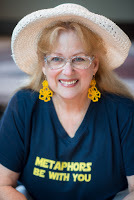 Ane Mulligan has been a voracious reader ever since her mom instilled within her a love of reading at age three, escaping into worlds otherwise unknown. But when Ane saw Mary Martin in PETER PAN, she was struck with a fever from which she never recovered—stage fever. She submerged herself in drama through high school and college. Years later, her two loves collided, and a bestselling, award-winning novelist emerged. She resides in Sugar Hill, GA, with her artist husband and a rascally Rottweiler. Find Ane on her website, Amazon Author page, Facebook, Twitter, Instagram, Pinterest and The Write Conversation.
Ane Mulligan has been a voracious reader ever since her mom instilled within her a love of reading at age three, escaping into worlds otherwise unknown. But when Ane saw Mary Martin in PETER PAN, she was struck with a fever from which she never recovered—stage fever. She submerged herself in drama through high school and college. Years later, her two loves collided, and a bestselling, award-winning novelist emerged. She resides in Sugar Hill, GA, with her artist husband and a rascally Rottweiler. Find Ane on her website, Amazon Author page, Facebook, Twitter, Instagram, Pinterest and The Write Conversation.
September 25, 2021
Learn What You Don't Know and Write That!
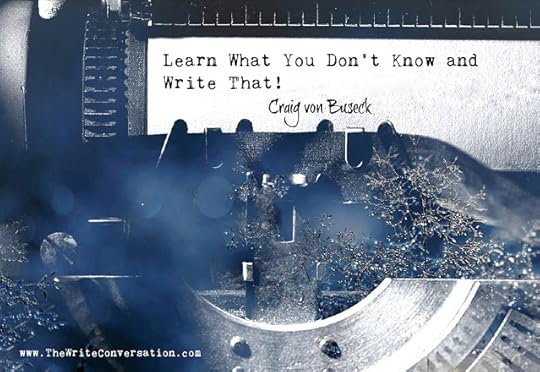
by Craig von Buseck @CraigVonBuseck
Many beginning writers have heard a seminar speaker or professor utter the familiar line, "Write what you know." The quote is attributed to Mark Twain—but is it wise? Is it true?
Writers have many opinions on the question.
Hemmingway agreed with Twain.
The great Nora Roberts did not. "You don't write what you know, or you would write one thing. I never understood that. You write what you want to find out."
Novelist Ursula K. Le Guin seems to agree and disagree at the same time: “As for “Write what you know” ... I think it’s a very good rule and have always obeyed it. I write about imaginary countries, alien societies on other planets, dragons, wizards, the Napa Valley in 22002. I know these things. I know them better than anybody else possibly could, so it’s my duty to testify about them. I got my knowledge of them, as I got whatever knowledge I have of the hearts and minds of human beings, through imagination working on observation..."
In his famous On Writing Well , William Zinsser takes the middle road: "Writing is thinking on paper, or talking to someone on paper. If you can think clearly, or if you can talk to someone about the things you know and care about, you can write—with confidence and enjoyment."
I tend to agree with short story writer and novelist Eudora Welty who declared: "Write about what you don't know about what you know."
In A Moveable Feast , Ernest Hemingway‘s memoir about his life as a writer in Paris, he cautions the writer to pull from the well of what is known so as not to lose this valuable resource. "What did I know best that I had not written about and lost? What did I know about truly and care for the most? There was no choice at all."
Getting to Know Harry T. BurleighMy take is that you mine your story ideas from what you know. In the process, you quickly realize how much you don’t know about the subject. If you’re going to write an excellent piece, you must take the deep dive to learn what you don’t know and as Welty observes, write about that.
For my first narrative biography, I discovered the story of the great African-American composer, Harry T. Burleigh, by watching a one man play written and performed by my friend, Charles Kennedy—the President of the Harry Burleigh Society—in our hometown of Erie, Pennsylvania. Burleigh was an Erie native, but shockingly, I had never heard his remarkable story, despite the fact that there was an elementary school named after him. Charles Kennedy made it part of his life’s work to change this shameful fact.
Inspired by Kennedy’s performance and intrigued by this short sketch of Burleigh’s life, I decided to make him the focus of my master’s thesis. I quickly learned how much I didn’t know about this important figure in American musical and cultural history. I spent the next few years studying the remarkable life of Harry T. Burleigh.
Two astounding discoveries confirmed I was on the right track in pursuing Burleigh’s story. In my research, I came across a National Public Radio news interview with musicologist, Dominique-René de Lerma where he made this remarkable statement: “In Harry T. Burleigh, you have the birth of American music.”
Somewhat dumbfounded, I continued to dig into Burleigh’s life—now with even more zeal.
The importance of Burleigh as a leading historical figure was again reinforced when my father and I visited the National Portrait Gallery of the Smithsonian Institution in Washington, D.C. Entering an exhibit called “Great African-American Leaders”, we viewed many of the portraits we expected to see—Martin Luther King, Jr., W. E. B. Du Bois, Marian Anderson. Then as we turned a corner, on display next to George Washington Carver was a portrait of Harry T. Burleigh.
I immediately declared to my father, “If Burleigh is good enough to be featured in the Smithsonian, I think I’m on the right path with this book project.”
In 2014, after extensive research, my book, Nobody Knows: The Harry T. Burleigh Story was released by Baker Publishing.
We decided on the title because so few people know about the important contribution made by Burleigh in arranging and publishing artistic versions of the Spirituals for the general public; in influencing Antonin Dvorak in the writing of his famous Symphony Number 9: From the New World; in traveling for years as the opening act for Booker T. Washington; in being handpicked by J. P. Morgan to be baritone soloist at St. George’s Episcopal Cathedral in Manhattan; in singing for Teddy Roosevelt as governor of New York and for King Edward in London; and in rising from poverty to become one of the most important musicians of his generation.
Almost nobody knows Burleigh’s story. Until I did the research, I didn’t know it. And that is my point. Yes, as a writer, we often begin with what we know, but then we dig in to find out what we don’t know—and that is the stuff that we should write about.
There Ain’t No Rules!In The Art of the Short Story, Ernest Hemingway observed: “You throw it all away and invent from what you know. I should have said that sooner. That’s all there is to writing.”
As Leo from the Scorpions hissed to Danny Zuko in 'Grease', "The rules are there ain't no rules." As you see from the opinions expressed here, there are many different approaches to writing and many different wells from which to draw your inspiration. Find what works for you and drop your bucket down to fill it.
My friend, Cec Murphy sums it up with this observation: "Write what you know. Write what you want to know more about. Write what you're afraid to write about."
Just get your pen or your typing fingers moving and write!
TWEETABLELearn What You Don't Know and Write That! encouragement from @CraigVonBuseck on @EdieMelson (Click to Tweet)
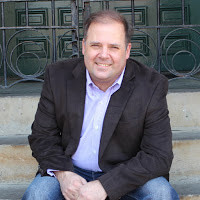 Dr. Craig von Buseck is an award-winning author and the Managing Editor for Inspiration.org. His new books are Victor! The Final Battle of Ulysses S. Grant, a biography of the final two years in Grant’s life, and the companion, Forward! The Leadership Principle of Ulysses S. Grant. Learn more at vonbuseck.com.
Dr. Craig von Buseck is an award-winning author and the Managing Editor for Inspiration.org. His new books are Victor! The Final Battle of Ulysses S. Grant, a biography of the final two years in Grant’s life, and the companion, Forward! The Leadership Principle of Ulysses S. Grant. Learn more at vonbuseck.com.
September 24, 2021
WHY DOES THE WORLD NEED STORIES - PART 2
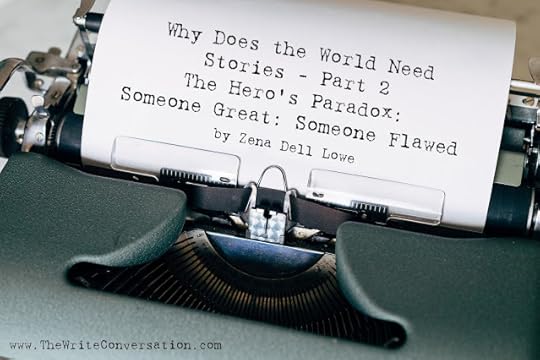
The Hero’s Paradox: Someone Great + Someone Flawedby Zena Dell Lowe @ZenaDellLowe
In my last post, I argued that the world needs stories about heroes now more than ever. Why? Because heroes inspire us to be greater than ourselves, to surpass our own limitations or painful life circumstances to truly exhibit heroic qualities. If we didn't have stories about heroes, we would see fewer acts of courage in real life. We would see fewer acts of self-sacrifice, forgiveness, and even love. Now, maybe you don’t think this discussion applies to you because you don’t see yourself as writing stories about heroes. But what if every story is ultimately a hero’s story? As Edgar Watson Howe says, “A boy doesn’t have to go to war to be a hero; he can say he doesn’t like pie when he sees there isn’t enough to go around.”
In other words, no matter what genre, no matter what type of stories you write, all stories reflect the hero’s journey. This means that every single protagonist is a hero in the making. We’ll find out at the end if the character succeeds or fails in becoming a hero, but we must believe at the outset that they at least have the potential to be heroic. But why? What does this mean to us on a practical level? Well, at the very least, it means there are certain personality traits or character flaws that are harder for writers to handle, because certain traits undermine the heroic potential of a character.
Herein lies the Hero’s Paradox. On the one hand, we must have a character who is “real” (i.e., flawed; a sinner). On the other hand, we must have a character who is great (i.e., made of the stuff of heroes). The problem is that we often give our protagonists flaws that not only undermine their heroic potential, but also make them morally reprehensible and evil.
For example, a friend of mine tweeted recently that his editor hated his main character because that character was so selfish. Having a selfish character is tricky to pull off because we typically don’t like selfish people. In fact, unless you manage to package that character with a whole lot of other traits that make him palatable, the audience will hate him, even subconsciously, because we know that a trait like selfishness means that he is unworthy – of our time, our devotion, our emotional investment – why should we care about him? The audience needs to have a sufficient reason to emotionally invest in that character’s journey. A characteristic like selfishness undermines the heroic potential of a character and weakens their moral reliability.
Characters should be realistic but not morally compromised. Story heroes must have human weaknesses, but their weaknesses should come from human frailty, not an attachment to sin. Any time our characters become attached to their sinful ways, they’re not just sinners; they’re evil. Therefore, our story heroes should hate their sins and work tirelessly to overcome them. Moreover, they should know what sin looks like. They cannot be confused about what’s good or bad. They cannot be moral relativists. They should agree that certain qualities such as selfishness are evil while other qualities such as selflessness are righteous -- even if they can’t live up to those standards. In their essential core, from which they derive power, they must uphold a consistent moral worldview.
Does this mean that some flaws are off the table? Not necessarily. When you give your protagonist the character flaw of being selfish, for example, it often doesn't work (for all of the reasons stated above). But it doesn’t mean you CAN’T have a character start out as selfish. It just means you must handle this flaw more carefully. For example, one way to make this character flaw work is to justify it. You have to truly justify why your character possesses such an ugly trait in the first place. When we find out their backstory, it should make us think, “Oh, man, they had it rough. No wonder they turned out this way!” Their wounds, trauma, background, etc. are what you use to justify this trait.
The goal is to give the character a deep enough wound to allow the audience to understand WHY they’re like that. But notice what I’m saying here: it doesn’t make the trait okay. Both the audience and the character need to understand that being selfish is still fundamentally wrong. It’s just that since we can understand how they came to be this way, we can offer grace – but only if whatever they’ve been through is sufficient for us to extend that grace. And by the way, “grace” just means “time.”
When grace is given in a story, it means that we, the audience, are willing to give that character time to work through their particular flaw. But make no mistake: they can’t keep it. Over the course of the telling, we expect them to work through their core issues to the point that they rid themselves of this quality and finally become heroic in the final act. If they don’t, they can never be heroic, we will stop giving them grace, and we’ll consider them a lost cause.
For example, fear is a by-product of human weakness, not an attachment to sin. Thus, it’s perfectly appropriate for a protagonist to struggle with their need for courage. However, by the end of the story, they must face this weakness in themselves and find a way to overcome it. If they don’t, this, too, would be evil. It would mean they gave into fear and let it overtake them or rob them of their ultimate purpose. They will have either committed a sin of omission (failing to act in a heroic way) or a sin of commission (actively behaving in a cowardly way). This trait, which started out as a mere human weakness, must now be looked upon as evil.
So, whether they possess a character flaw that could be classified as “evil,” or whether it stems from human weakness, both types must be rooted out and destroyed. They need to hate their sin. They need to hate it so badly that they will do anything they can to get rid of it. And if they fail, it means not only that they’ve failed to become the hero they had the potential to be, but they have also succumbed to evil.
All this to say, we need to think carefully about the character flaws we give our protagonists, the purpose for those flaws, and the conclusions our audience may draw as a result of how our characters handle those flaws. Thinking clearly about these issues will not only prevent us from muddying the waters of morality, but it will also help us to tell much better stories.
TWEETABLEWhy Does the World Need Stories: The Heroes Paradox: Someone Great + Someone Flawed via @ZenaDellLowe on @EdieMelson (Click to Tweet)
Don't Miss the Other Posts in This SeriesWhy Does the World Need Stories, Part 1
 Zena has worked professionally in the entertainment industry for over 20 years as a writer, producer, director, actress, and story consultant. Zena also teaches advanced classes on writing all over the country. As a writer, Zena has won numerous awards for her work. She also has several feature film projects in development through her independent production company, Mission Ranch Films. In addition to her work as a filmmaker, Zena launched The Storyteller’s Mission with Zena Dell Lowe, a podcast designed to serve the whole artist, not just focus on craft. In 2021, Zena launched The Storyteller’s Mission Online Platform, where she offers advanced classes and other key services to writers. Zena loves story and loves to support storytellers. Her passion is to equip artists of all levels to achieve excellence at their craft, so that they will truly have everything they need to change the world for the better through story.
Zena has worked professionally in the entertainment industry for over 20 years as a writer, producer, director, actress, and story consultant. Zena also teaches advanced classes on writing all over the country. As a writer, Zena has won numerous awards for her work. She also has several feature film projects in development through her independent production company, Mission Ranch Films. In addition to her work as a filmmaker, Zena launched The Storyteller’s Mission with Zena Dell Lowe, a podcast designed to serve the whole artist, not just focus on craft. In 2021, Zena launched The Storyteller’s Mission Online Platform, where she offers advanced classes and other key services to writers. Zena loves story and loves to support storytellers. Her passion is to equip artists of all levels to achieve excellence at their craft, so that they will truly have everything they need to change the world for the better through story.To find out more about Zena or her current courses and projects, check out her websites at WWW.MISSIONRANCHFILMS.COM and WWW.THESTORYTELLERSMISSION.COM



